
PSYCHOLOGICAL METHODS
Scope & Guideline
Enhancing Psychological Science Through Methodological Rigor
Introduction
Aims and Scopes
- Statistical Methodologies in Psychology:
The journal publishes research that develops and evaluates statistical methods specifically tailored for psychological research, including Bayesian approaches, structural equation modeling, and multilevel modeling. - Measurement and Psychometrics:
A core focus is on advancing psychometric techniques, including the assessment of measurement invariance, reliability, and validity of psychological instruments, as well as addressing issues related to missing data. - Causal Inference and Experimental Design:
Research addressing causal relationships, mediation analysis, and experimental design methodologies is prevalent, aiming to refine how causal effects are estimated within psychological contexts. - Longitudinal and Intensive Data Analysis:
The journal emphasizes methodologies for analyzing longitudinal data, including time-series analysis and intensive longitudinal designs, to understand changes in psychological constructs over time. - Network Analysis in Psychology:
Increasingly, the journal explores network psychometrics, examining the interrelations among psychological variables and the implications for understanding complex psychological phenomena.
Trending and Emerging
- Bayesian Methods:
There is a significant increase in the use of Bayesian statistical methods, reflecting a broader trend towards incorporating prior knowledge and uncertainty into psychological research and data analysis. - Machine Learning and Artificial Intelligence:
Emerging themes include the application of machine learning techniques for data analysis, particularly in the context of psychological assessments and predictive modeling, highlighting the intersection between psychology and computational methods. - Network Psychometrics:
Research focusing on network models to understand the relationships between psychological variables is on the rise, indicating a shift towards more holistic views of psychological constructs and their interdependencies. - Missing Data Techniques:
Innovative approaches to handling missing data, including multiple imputation and sensitivity analyses, are becoming increasingly prominent, reflecting the importance of robust data handling in psychological research. - Dynamic and Longitudinal Modeling:
The trend towards dynamic modeling techniques that account for changes over time in psychological processes is gaining momentum, allowing for more nuanced understandings of psychological phenomena.
Declining or Waning
- Traditional Hypothesis Testing:
There is a noticeable decline in the emphasis on traditional frequentist hypothesis testing methods, as the field increasingly embraces Bayesian approaches and alternative statistical frameworks that offer richer interpretations of data. - Basic Descriptive Statistics:
Basic descriptive statistics and simple correlational analyses appear less frequently, as the journal's focus shifts towards more complex modeling techniques that can capture the intricacies of psychological phenomena. - Single-Cohort Studies:
There is a waning interest in studies that focus solely on single-cohort analyses, with a growing preference for multi-cohort and longitudinal approaches that provide more comprehensive insights into psychological changes over time.
Similar Journals
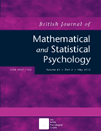
BRITISH JOURNAL OF MATHEMATICAL & STATISTICAL PSYCHOLOGY
Innovating Methodologies for Complex Psychological ResearchThe British Journal of Mathematical & Statistical Psychology, published by Wiley, is a prestigious peer-reviewed journal that plays a pivotal role in advancing the interdisciplinary fields of psychology, mathematics, and statistics. With an ISSN of 0007-1102 and an E-ISSN of 2044-8317, it boasts a Category Quartile ranking of Q1 in diverse areas including Arts and Humanities, Medicine, Psychology, and Statistics and Probability as of 2023, signifying its considerable impact and relevance. This journal provides a platform for the dissemination of high-quality research and innovative methodological advancements that address complex psychological phenomena through rigorous statistical frameworks. It covers a breadth of topics from classic problems to modern data analytic techniques, appealing to researchers, professionals, and students alike. Founded in 1965, the journal continues to thrive global scholarly dialogue until 2024, fostering collaboration among disciplines and enhancing understanding of psychological data. Although it is not an open access journal, its rigorous selection process ensures that only the most significant and impactful research is published, further maintaining its esteemed position within the academic community.
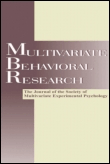
MULTIVARIATE BEHAVIORAL RESEARCH
Exploring the Complexities of Behavior Through Multivariate Lenses.MULTIVARIATE BEHAVIORAL RESEARCH, published by ROUTLEDGE JOURNALS, TAYLOR & FRANCIS LTD, stands as a pivotal resource in the fields of psychology, statistics, and the arts. With a rich history dating back to 1966 and continuing through 2024, this journal caters to the ever-evolving landscape of behavioral research by offering rigorous peer-reviewed articles that explore the intersections of experimental methodologies and cognitive theories. It proudly holds prestigious Q1 rankings across multiple categories, including Arts and Humanities, Experimental and Cognitive Psychology, and Statistics, reflecting its influence and relevance in academia. Although the journal does not currently offer Open Access options, it remains impactful, with impressive rankings in Scopus, placing it in the top percentiles across its disciplines. This journal is an essential platform for researchers, professionals, and students seeking to deepen their understanding of complex behavioral phenomena through multivariate analysis.
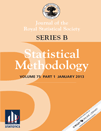
JOURNAL OF THE ROYAL STATISTICAL SOCIETY SERIES B-STATISTICAL METHODOLOGY
Empowering Researchers with Cutting-Edge MethodologiesJOURNAL OF THE ROYAL STATISTICAL SOCIETY SERIES B-STATISTICAL METHODOLOGY, published by OXFORD UNIVERSITY PRESS, is a leading academic journal dedicated to advancing the field of statistical methodology. With a distinguished Q1 ranking in both Statistics and Probability and Statistics, Probability and Uncertainty as of 2023, this journal stands at the forefront of statistical research, serving as a vital resource for researchers, professionals, and students alike. The journal has been committed to fostering innovative statistical techniques and methodologies since its inception in 1997, covering a wide scope of topics that push the boundaries of statistical applications in various disciplines. Based in the United Kingdom, the journal maintains its reputation through rigorous peer-review practices and high-quality content, making it an indispensable platform for those looking to disseminate their findings and engage with current trends in statistical science. Although the journal does not offer open access, the impact and scholarly significance of its articles remain profoundly influential in shaping contemporary statistical discourse.

Quantitative Methods for Psychology
Empowering Minds with Innovative Statistical TechniquesQuantitative Methods for Psychology, with ISSN 1913-4126 and E-ISSN 2292-1354, is a premier open-access journal published by the University of Montreal, Department of Psychology. Since its inception in 2005, this journal has served as a vital resource for the dissemination of cutting-edge research and methodological advancements in psychological science. With a focus on quantitative approaches, it welcomes submissions that explore innovative statistical techniques, data analysis methodologies, and empirical studies that enhance understanding in psychology. The journal’s commitment to accessibility ensures that researchers, practitioners, and students alike can benefit from the wealth of knowledge it offers, fostering collaboration and advancing the field. As an integral platform for sharing significant findings and best practices, Quantitative Methods for Psychology is positioned to make substantial contributions to the landscape of psychological research.

Statistics in Biosciences
Driving Innovation at the Intersection of Stats and Life SciencesStatistics in Biosciences is a distinguished journal published by Springer, focusing on the innovative interplay between statistical methodologies and biosciences. Established in 2009, this journal aims to provide a platform for the dissemination of cutting-edge research in statistical applications within biochemistry, genetics, and molecular biology. With an impressive impact factor and a distinguished ranking in multiple categories, including Q2 in Biochemistry, Genetics and Molecular Biology (miscellaneous) and Q3 in Statistics and Probability, it serves as a crucial resource for researchers, professionals, and students seeking to deepen their understanding of statistical applications in biological contexts. The journal is accessible through traditional subscription models, ensuring that high-quality research remains available to a wide audience. Featuring contributions that advance statistical theory and application in the biosciences, Statistics in Biosciences is committed to fostering collaboration and innovation in a rapidly evolving scientific landscape.

JOURNAL OF PSYCHOPATHOLOGY AND BEHAVIORAL ASSESSMENT
Delving into the intricacies of psychological disorders.JOURNAL OF PSYCHOPATHOLOGY AND BEHAVIORAL ASSESSMENT is a prominent scholarly publication dedicated to advancing the field of clinical psychology through innovative research and comprehensive assessments of psychological disorders. Published by Springer/Plenum Publishers in the United States, this journal has an established history of contributing to the academic community since its inception in 1985, continuing its mission until 2024. With an impact factor that properly reflects its academic rigor and relevance, it ranks in the Q2 category in Clinical Psychology for 2023, placing it within the top tier of academic journals in the field. Researchers, professionals, and students can expect to find a wealth of insightful articles that delve into the complexities of psychopathology and behavioral assessment, fostering a deeper understanding of mental health issues. Although open access options are not available at this time, subscribers and institutions have the privilege of accessing critical findings that could transform clinical practices and inform future research initiatives.

BIOMETRICS
Driving Innovation in Biochemistry and Applied MathematicsBIOMETRICS, published by WILEY, stands as a prestigious journal that has made substantial contributions across diverse fields, including Agricultural and Biological Sciences, Applied Mathematics, and Biochemistry. With an impressive track record from its inception in 1946 and continuing through to 2024, this journal is recognized for its rigorous peer-reviewed research and high-impact findings, evidenced by its Q1 ranking in various categories such as Medicine and Statistics. Researchers and professionals alike will find a wealth of knowledge within its pages, making it an essential resource for anyone involved in these dynamic and evolving disciplines. While BIOMETRICS does not offer open access, its reputation for delivering high-quality research ensures its continued importance in advancing the scientific ecosystem. For those seeking to stay ahead in their fields, engaging with the latest studies published in this journal is indispensable.
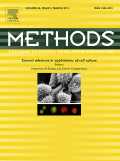
METHODS
Innovative insights into biochemistry and genetics.METHODS is a premier journal published by Academic Press Inc Elsevier Science, dedicated to advancing the field of Biochemistry, Genetics, and Molecular Biology. With an ISSN of 1046-2023 and E-ISSN 1095-9130, this distinguished journal has established itself as a vital resource since its inception in 1990, providing high-quality research articles and methodological insights crucial for both seasoned researchers and students alike. The journal ranks in the Q1 category for miscellaneous areas within Biochemistry and Genetics, and maintains a Q2 ranking in Molecular Biology, reflecting its impact within the scientific community, evidenced by Scopus rankings that place it in the top 20% of its field. METHODS offers a platform for showcasing innovative research methods and their applications, contributing significantly to the development of new technologies and analytical techniques. Though not an open-access journal, it remains a highly regarded publication that assures readers of rigorous peer review and academic integrity, making it an essential addition to any serious researcher's library.
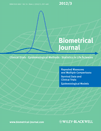
BIOMETRICAL JOURNAL
Exploring cutting-edge methodologies for a healthier future.BIOMETRICAL JOURNAL is a prestigious academic publication dedicated to advancing the fields of Medicine and Statistics. Published by WILEY since its inception in 1977, this journal plays a critical role in disseminating cutting-edge research and methodologies that bridge the gap between statistical theory and real-world medical applications. With an impressive Q1 ranking in both Medicine (miscellaneous) and Statistics, Probability and Uncertainty, it is recognized for its high-impact contributions to the scientific community. The journal actively encourages submissions that utilize innovative statistical techniques to address complex biomedical issues, making it an essential resource for researchers, professionals, and students aiming to enhance their understanding of quantitative approaches in health and medicine. Although the journal is not open access, its rigorous peer-review process guarantees the quality and relevance of published works, further establishing its significance in the academic landscape.
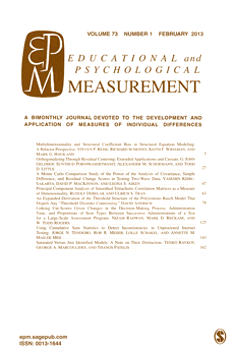
EDUCATIONAL AND PSYCHOLOGICAL MEASUREMENT
Advancing the Science of AssessmentEDUCATIONAL AND PSYCHOLOGICAL MEASUREMENT, published by SAGE Publications Inc, is a premier journal serving as a vital resource for researchers and practitioners in the fields of educational and psychological assessment. With a rich history dating back to 1941, this esteemed journal encompasses a wide-ranging scope, exploring the intricacies of measurement techniques and their implications within applied mathematics, psychology, and education. Notably categorized in Q1 quartiles across various fields, including Applied Mathematics and Educational Psychology, the journal ranks impressively in Scopus, reflecting its high impact and relevance—ranked #82/635 in Applied Mathematics and #232/1543 in Education. The journal’s commitment to advancing knowledge in educational measurement equips scholars with essential insights and methodologies, making it an essential tool for advancing scholarly inquiry and practice. With no open access limitations, EDUCATIONAL AND PSYCHOLOGICAL MEASUREMENT is dedicated to disseminating quality research that influences educational practices and psychological evaluation, thus reinforcing its esteemed position within academia.